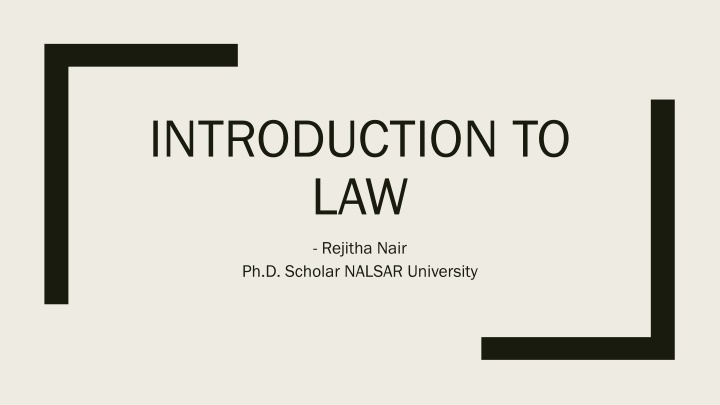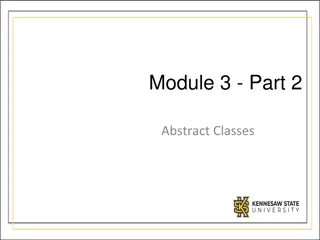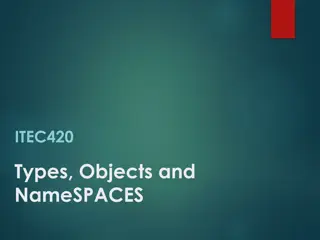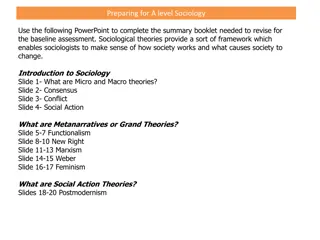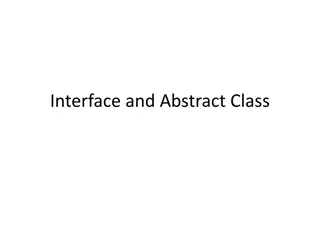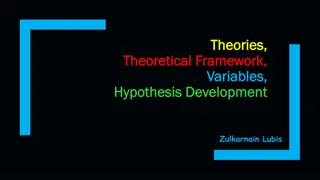Broad Classes of Law Definitions and Theories
Classifications and theories of law, including Natural Law, Legal Positivism, Historical School, Sociological/Functional School, and Legal Realism. Explore major exponents like John Austin, Hans Kelson, HLA Hart, and more. Compare views on law, morality, and the connection between them. Discover the principles of Natural Law Theory outlined by Thomas Acquinas, Lon Fuller, and Ronald Dworkin. Idealistic views on law from Ulpine, Cicero, and ancient Hindu perspectives.
Download Presentation

Please find below an Image/Link to download the presentation.
The content on the website is provided AS IS for your information and personal use only. It may not be sold, licensed, or shared on other websites without obtaining consent from the author.If you encounter any issues during the download, it is possible that the publisher has removed the file from their server.
You are allowed to download the files provided on this website for personal or commercial use, subject to the condition that they are used lawfully. All files are the property of their respective owners.
The content on the website is provided AS IS for your information and personal use only. It may not be sold, licensed, or shared on other websites without obtaining consent from the author.
E N D
Presentation Transcript
INTRODUCTION TO LAW - Rejitha Nair Ph.D. Scholar NALSAR University
What is Law? 5 broad classes of definition emerging from 5 major theories of law a) Natural Law theory ----Idealistic, b) Legal Positivism----Positivistic, c) Historical School----Historical, d) Sociological/ functional school---Sociological definition e) Legal Realism---Realistic.
Legal Positivism Major exponents: Major exponents: John Austin, Hans Kelson, HLA Hart, Joseph Raz. Law is a concept based upon the notion of power and it need not be looked at from the perspective of moral concepts Law and morality are devoid of any relationship or connection. The legal validity of the norm shall be located in its source not content.
Positivistic Definition Austin Austin- Law is a command given by a determinate political superior to an political inferior enforced by sanction. Kelsen Kelsen gave a pure theory of law . The science of law to Kelson is the knowledge of hierarchy of normative relations. All norms derive their power from the ultimate norm called Grundnorm. HLA HLA Hart Hart: : Primary and secondary rules together form a legal system. Primary rules impose obligations and secondary rules inform how to enact, amend and enforce a law
Natural Law Theory Main Exponents: Main Exponents: Thomas Acquinas, Lon Fuller and Ronald Dworkin There is necessary Connection between law and morality Thomas Thomas Acquinas Acquinas Divine conception of Law Lon Fuller s Lon Fuller s Inner Morality of Law The rules must be general o The rules must be promulgated o Retroactive rulemaking and application must be minimized o The rules must be understandable o The rules must not be contradictory o The rules must not be impossible to obey o The rules must be relatively constant through time and o There should be congruence between rules as announced Ronald Dworkin: Ronald Dworkin: law is not merely a system of rules, but there are also principles, policies and other sort of standards that govern the legal system. o
Idealistic Definition Ulpine Ulpine defined Law as the art or science of what is equitable and good. Cicero Cicero said that Law is the highest reason implanted in nature. Justinian s Justinian s Digest defines Law as the standard of what is just and unjust. Ancient Ancient Hindu political sovereign. Everybody including the ruler, is bound to obey it. Hindu view was that law is the command of God and not of any Salmond, Salmond, the prominent modern idealistic thinker, defines law as the body of principles recognized and applied by the State in the administration of justice.
Historical School Main Exponents: Main Exponents: Friedrich Carl von Savigny and Sir Henry Maine Law is the reflection of the spirit of the people (Volksgeist) According to Savigny there are following four characteristics of law 1. Law is a matter of unconscious and organic growth. Therefore, law is found and not made. 2. Law is not universal in its nature. Like language, it varies with people and age 3. Customs are superior to legislations 4. Jurists are more important than legislators.
Sociological School Main Exponents: Main Exponents: Leon Duguit, Ihering and Roscoe Pound law as a social phenomenon. Reject any absolutist conception of state power and abstract conception of rights Basis of law is in the fact that humans are social animals endowed with a universal sense or instinct of solidarity and social interdependence. According to Ihering i)Law has a coercive character ;ii)it has only a relative value; and iii)it has to be evaluated in the social context Roscoe pound says law is a tool to harmonize social interest that may be in conflict.
Sociological Definition Duguit Duguit defines law as essentially and exclusively as social fact. Ihering Ihering defines law as the form of the guarantee of the conditions of life of society, assured by State s power of constraint . Roscoe Roscoe Pound Pound - Law as an an instrument of social engineering. It reduces friction caused by conflicting pulls of political philosophy, economic interests and ethical values constantly struggling for recognition.
Realist Definition Realists define law in terms of judicial processes. Oliver Oliver Wendell which public force will be brought to bear upon through courts. Wendell Holmes Holmes, Law is a statement of the circumstances in Benjamin Benjamin N N Cardozo to justify a prediction with reasonable certainty that it will be enforced by the courts if its authority is challenged, is a principle or rule of law. Cardozo, A principle or rule of conduct so established as
Global Legal Systems Common Law System Common Law System o Precedents o Adversarial system o Judge is impartial arbiter o Work of jurists are of little relevance o Does not necessarily have a codified constitution or laws
Global Legal Systems Civil Law Civil Law o Judgements are not binding on subsequent cases o Inquisitorial system o Codification of laws o Juristic writings are of much importance Religious legal system Religious legal system
Sources of Law Principal Sources of Indian Law: Principal Sources of Indian Law: 1. Customs or Customary Law. 2. Judicial Decisions or Precedents. 3. Statutes or Legislation. 4. Personal Law e.g., Hindu and Mohammedan Law, etc. Secondary Source of Indian Law Secondary Source of Indian Law 1. Justice, Equity and Good Conscience
Customs Long-established practice considered as unwritten law. Requisites of a Valid Custom 1. Antiquity 2. Certainty 3. Reasonableness 4. Compulsory observance 5. Conformity with law and public morality 6. Unanimity of opinion 7. Peaceable enjoyment 8. Consistency
Judicial Precedents Authority of past decisions of the courts for future cases. Decisions which lay down some new rule or principle are called judicial precedents. General Principles of Doctrine of Precedents: 1. Each court lower in the hierarchy is absolutely bound by the decisions of the courts above it. 2. in general higher courts are bound by their own decisions
Hierarchy of Indian Courts Supreme court High Courts District and Sessions Court
Type of Precedents Type of Precedents (a) declaratory and original, (b) persuasive, (c) absolutely authoritative, and (d) conditionally authoritative. Doctrine of Stare Decisis Doctrine of Stare Decisis: The doctrine of stare decisis means adhere to the decision and do not unsettle things which are established . Ratio Decidendi: Ratio Decidendi: The underlying principle of a judicial decision, which is only authoritative, is termed as ratio decidendi. Obiter Dicta: Obiter Dicta: The literal meaning of this Latin expression is said by the way . Denotes those judicial utterances in the course of delivering a judgement which taken by themselves, were not strictly necessary for the decision of the particular issue raised
Statutes or Legislation Statutes or Legislation Legislations are declaration or promulgation of legal rules by an authority duly empowered by the Constitution in that behalf. It is sometimes called Jus scriptum (written law) as contrasted with the customary law or jus non-scriptum (unwritten law). Statute law or statutory law is what is created by legislation, for example, Acts of Parliament or of State Legislature. Two types of legislation: 1. supreme 2. subordinate (delegated).
Personal Law Personal Law Personal laws applies to a certain class or group of people or a particular person, based on the religions, faith, and culture. Hindus personal law is to be found in: The Shruti which includes four Vedas. o The Smritis which are recollections handed down by the Rishi s or ancient teachings and precepts of God, the commentaries written by various ancient authors on these Smritis. There are three main Smritis; the Codes of Manu, Yajnavalkya and Narada. o Mohammedan personal law is to be found in The holy Koran. o Hadis. o Ijmas o Kiyas or reasoning by analogy. o Digests and Commentaries on Mohammedan law, like Hedaya and Fatawa Alamgiri o
Secondary Source of Law Justice, Justice, Equity Such considerations as the requirements of natural Justice, the taking of a realistic view, the necessity of doing what is right and fair and honest conscientious observance of rules of fair play, the quality of being equal or fair, common fairness as opposed to meticulous insistence upon the formalities of the law. [Long Service Leave (Engine Driver) Award case (1961) AELR, case 308] Equity and and Good Good Conscience Conscience between man and man,
CLASSIFICATION OF LAWS CLASSIFICATION OF LAWS Civil Civil Disputes between individuals Criminal Criminal Dispute between State and the individual object of the law is to punish the wrongdoer; to deter not to commit same or similar crimes, to reform and for retribution filed by the Government prove beyond a reasonable doubt Standard Criminal/ Sessions courts Object of civil law is the redress of wrongs by compelling compensation or restitution Filed by the private party standard of proof is Preponderance of evidence Civil Courts
Territorial Territorial Laws applicable to everyone in the territory of India Eg. Indian Penal Code, Special Marriage Act Personal Personal Laws applicable to only a certain religious or faith based group Muslim Personal Law on Marriage and Divorce Substantive Substantive Procedural Procedural Defines the rights, duties, obligations and powers of people Rules and regulations that govern the procedures of civil, criminal and administrative courts. eg: Indian Penal Code eg: Criminal Procedure Code
OPERATIVE TOOLS OF LAW OPERATIVE TOOLS OF LAW I. Rights and Duties: Rights and Duties: o Salmond: A legal right is an interest recognized and protected by a rule of legal Justice .. . o Holland: A right means a capacity residing in one man of controlling with the assent and assistance of the state the acts of the other .
Classification of Rights o Fundamental rights o Public rights o Personal rights o Customary rights o Contractual rights
REMEDIES UNDER LAW REMEDIES UNDER LAW Constitutional Law Constitutional Law o Writs : Habeas Corpus, Quo Warranto, Mandamus, Certiorari, Prohibition Civil Law Civil Law o Damages: General and Special o Maintenance o Mesne Profits o Partition
REMEDIES UNDER LAW REMEDIES UNDER LAW Criminal Law Criminal Law o Death o Imprisonment for life o Imprisonment- Rigorous and Simple o Forfeiture of property o Fine o Compensation
REMEDIES UNDER LAW REMEDIES UNDER LAW Consumer Protection Law Consumer Protection Law Repair of defective goods. o Replacement of defective goods. o Refund of price paid for the defective goods or service. o Removal of deficiency in service. o Refund of extra money charge. o Withdrawal of goods hazardous to life and safety. o Compensation o Adequate cost of filing and pursuing the complaint. o Grant of punitive damages. o
LEGAL SYSTEM AMONGST INTERNATIONAL LEGAL SYSTEM AMONGST INTERNATIONAL INSTITUTIONS AND COUNTRIES INSTITUTIONS AND COUNTRIES Treaties Customary International Law: state action and opinio Juris International Institutions: United Nations, World Trade Organizations Regional Institutions: European Union , SAARC Impact of International agreements on Domestic laws
